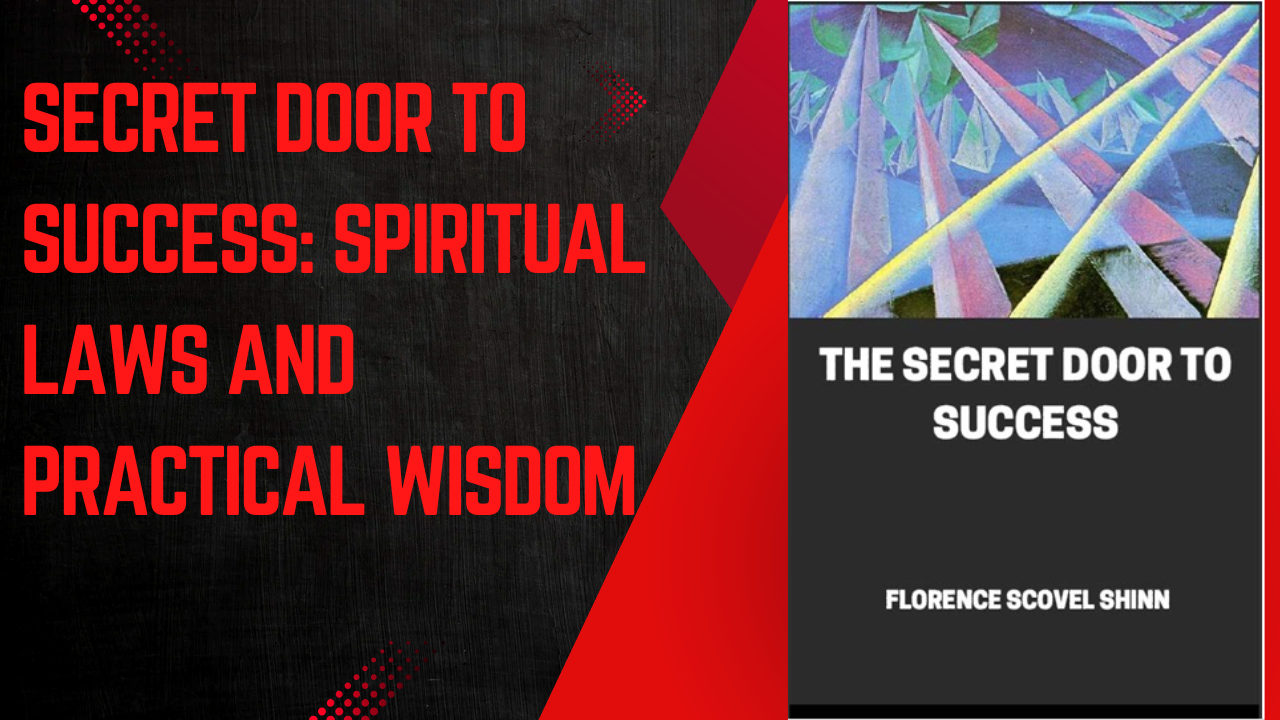
Florence Scovel Shinn’s The Secret Door to Success (1941) offers a spiritual guide to achieving personal success by understanding and applying metaphysical laws. The book utilizes biblical stories and parables as allegories to illustrate principles such as the power of words, thoughts, faith, intuition, and the importance of releasing negative emotions. Shinn encourages readers to actively shape their reality through positive affirmations, expectancy, and by aligning their consciousness with the divine source of abundance. Ultimately, the text posits that success is not a secret, but a system accessible through a shift in one’s inner beliefs and attitudes.
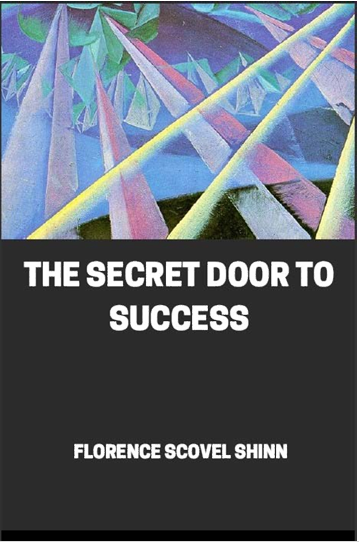
What is the “secret door to success” according to the text?
The “secret door to success” involves taking an interest in your work and enjoying what you are doing. It also includes neutralizing envy and resentment by focusing on what God can do for you, rather than resenting the success of others. The story of Jim Tully exemplifies how dramatizing one’s life and being absorbed in one’s work can lead to success.
What are some of the “walls” that can block one’s good, and how can they be overcome?
Walls that block one’s good include resentment, living in the past, complaining about misfortunes, and excessive talking about one’s affairs. To overcome these walls, the text suggests neutralizing envy and resentment with affirmations like “What God has done for others, He now does for me and more.” It also emphasizes the power of silence, focusing on the present, and actively engaging with one’s work. The power of the spoken word to dissolve obstacles, as illustrated in the story of Joshua and the walls of Jericho, is crucial.
How does the parable of the Wise and Foolish Virgins relate to achieving one’s desires?
The parable highlights the importance of preparation and active faith. The wise virgins brought oil for their lamps, symbolizing preparedness for their good. To bring manifestations to pass, the text suggests acting as if you have already received what you are praying for. This preparation puts you in the vibration of your desired outcome, making its manifestation more likely. The man who bought a trunk before his trip is a great example of preparation.
What is the significance of trusting God for supply, and how does it differ from a material attitude toward money?
Trusting God for supply means having faith that your needs will be met through divine channels, rather than solely relying on your salary, income, or investments. This spiritual attitude involves recognizing your possessions as God in manifestation and understanding that when one door closes, another opens. The opposite would be a material attitude that trusts in tangible sources of income but loses faith with their loss.
How does resentment act as a “King-Pin” that holds back one’s good, and what is the remedy?
Resentment can become a habitual thought pattern that negatively affects one’s expression and attracts more situations to resent. It blocks golden opportunities and makes one disagreeable. The remedy involves identifying resentment as the “King-Pin” and consciously changing one’s expression to a more pleasant one.
What does it mean to “let God juggle the situation,” and why is it important?
“Letting God juggle the situation” means trusting in Infinite Intelligence to handle affairs, rather than trying to control or manipulate them with the intellect. The intellect is limited and may lead to worry and fear, whereas spiritual law can bring about unexpected and positive solutions. “Before you call, you are answered, for ‘time and space are but a dream.'”
How do words and thoughts influence one’s reality, and what role does the “watchman at the gate” play in this process?
Words and thoughts are described as powerful forces that shape one’s reality. The “watchman at the gate” refers to the superconscious mind, which has the ability to choose and control one’s thoughts. By being vigilant over one’s thoughts and dissolving negative ones, one can create a more positive and constructive reality. Words and thoughts are like “radio activity and do not return void,” so ensure they are sending what you wish to reap.
How can one cultivate a “rich consciousness” and attract abundance, and what is the role of praise and thanksgiving in this process?
Cultivating a “rich consciousness” involves changing one’s thoughts and focusing on abundance rather than lack. It also involves using praise and thanksgiving when looking for one’s needs. Expectancy always wins and praise and thanksgiving open the gates. “Praise and thanksgiving open the gates, for expectancy always wins.”
Unlocking Your Potential: A Study Guide to Florence Scovel Shinn’s “The Secret Door to Success”
I. Key Concepts and Themes
This section outlines the core ideas presented in Florence Scovel Shinn’s “The Secret Door to Success.” Understanding these concepts is crucial for interpreting the text and applying its principles.
- The Power of the Word: Words, spoken or thought, have creative power. They act as blueprints, shaping one’s reality. Positive and affirmative words attract positive outcomes, while negative words manifest negative experiences. This aligns with the concept of vibration and attraction.
- The Importance of Consciousness: One’s consciousness, encompassing thoughts, beliefs, and expectations, determines the nature of their experiences. A consciousness filled with lack, fear, or resentment will attract those very conditions. Cultivating a consciousness of abundance, faith, and gratitude opens the “secret door” to success.
- Overcoming Obstacles (Jericho): The walls of Jericho symbolize obstacles that block one’s path to success. These obstacles can be internal (negative beliefs, resentment, fear) or external (difficult circumstances). The “shout,” representing the power of the word and faith, can dissolve these barriers.
- The Law of Preparation: True prayer, or affirmation, requires preparation. Acting as if one has already received their desire demonstrates active faith and puts them in alignment with their desired outcome. This involves taking concrete steps, even seemingly small ones, to prepare for the manifestation of their good.
- Trusting Divine Guidance: Relying on intuition and inner guidance is crucial for navigating life’s challenges. The “superconscious mind” or “Watchman at the Gate” is always available to provide direction. Ignoring this inner voice leads to misalignment and missed opportunities.
- Non-Resistance and Letting Go: Forcing one’s will or clinging too tightly to a desired outcome creates resistance and blocks the flow of good. Learning to relax, trust the process, and let go allows the “law of attraction” to operate effectively.
- The “Promised Land”: The Promised Land represents the fulfillment of one’s desires and the attainment of a life of abundance, joy, and purpose. This is accessible to everyone who aligns their consciousness with Divine Law.
- The “Long Arm of God”: This symbolizes Divine protection and intervention in one’s life. It represents the power of the Universe to control situations and protect one’s interests when one surrenders their worries and trusts in God’s plan.
- The role of Metaphysics: Metaphysics is presented as a source of wisdom, connecting to ancient teachings and promoting alignment with universal laws for personal growth and success.
II. Short-Answer Quiz
Answer each question in 2-3 sentences.
- According to Shinn, what is the relationship between your words and your reality?
- How does resentment act as a “wall” around your “Jericho,” and what statement can neutralize it?
- Explain the concept of “bricks without straw” and how to overcome this situation.
- Describe the “law of preparation” as illustrated by the student who wanted to travel abroad.
- What does Shinn mean by “living in the fourth dimension,” and how does it relate to manifesting desires?
- What is the significance of the “Watchman at the Gate,” and how can one become aware of it?
- Explain the concept of “iron-dogging” and its impact.
- How does Shinn interpret the story of Snow White and the Seven Dwarfs?
- According to Shinn, what does it mean to “Let God Juggle this situation”?
- What are examples of taking “oil for your lamps”?
III. Answer Key to Short-Answer Quiz
- Your words have creative power and act as blueprints for your reality; positive and affirmative words attract positive outcomes, while negative words manifest negative experiences. Therefore, it’s crucial to choose your words carefully.
- Resentment shuts off your good and prevents you from attracting success. The statement “What God has done for others, He now does for me and more” can neutralize envy and resentment.
- “Bricks without straw” represents a seemingly hopeless situation where resources are lacking. Overcoming this involves faith in the unexpected and the power of the statement: “The unexpected happens, my seemingly impossible good now comes to pass.”
- The student demonstrated the law of preparation by buying a trunk before having the money for the trip. This act of faith put him in the vibration of his desire, leading to its eventual manifestation.
- Living in the fourth dimension means seeing through appearances and judging not by them. It involves training your inner eye to see through failure into success, to see through sickness into health, and to see through limitation into plenty.
- The Watchman at the Gate is the superconscious mind, which is a mental guard that observes the thoughts entering your mind and ensures only positive thoughts are admitted. One can become aware by choosing thoughts and words wisely to master any situation.
- “Iron-dogging” refers to living in the past, reminiscing about past glories that may not be as accurate as you think. It can prevent you from seeing and seizing opportunities in the present.
- Snow White is an allegory for the journey through life where fairy tales come down from old legends of Persia, India, and Egypt, which are founded on truth. It speaks to the ability to trust in the Divine and the ultimate triumph of good.
- To “Let God juggle the situation” means to surrender your worries to the Divine. Instead of trying to control outcomes with your intellect, trust in spiritual law and allow your blessing to be released by faith and the word.
- Taking “oil for your lamps” means preparing for your good and demonstrating active faith in your desired outcome. This could involve taking steps toward a goal, making affirmative statements, or visualizing success.
IV. Essay Questions
Consider these questions for deeper reflection and analysis.
- Discuss the role of both spoken and unspoken words in shaping one’s reality, according to Florence Scovel Shinn. How can one become more mindful of their language and use it to create a more positive life?
- Explain the concept of “consciousness” as presented by Shinn. How can someone transform their consciousness from one of lack and limitation to one of abundance and possibility? Provide specific examples and techniques from the text.
- Analyze Shinn’s use of biblical stories and fairy tales. What purpose do these narratives serve in conveying her message? How do they make her ideas more accessible and relatable?
- Discuss the relationship between faith, preparation, and manifestation. How does one create the conditions for their desires to manifest? What role does trust and non-resistance play in this process?
- How does Shinn differentiate between the material and spiritual attitude towards money?
V. Glossary of Key Terms
- Affirmation: A positive statement of truth, repeated regularly to impress the subconscious mind and attract desired outcomes.
- Consciousness: One’s state of mind, encompassing thoughts, beliefs, and expectations.
- Divine Intelligence: The all-knowing, all-powerful creative force of the Universe (God).
- Faith: Complete trust and belief in Divine Intelligence and the power of the word.
- Imagination: The creative faculty of the mind, used to visualize and create desired outcomes.
- Intuition: Inner guidance or knowing, received from the superconscious mind.
- Karma: The law of cause and effect. The principle that actions, both positive and negative, return to the individual.
- Lack: A state of deficiency or want, often rooted in negative beliefs and thoughts.
- Manifestation: The process of bringing something into physical reality.
- Metaphysics: The study of the fundamental nature of reality, including the relationship between mind, matter, and spirit.
- Non-Resistance: The act of letting go of resistance and allowing the flow of good.
- Promised Land: A metaphor for the fulfillment of one’s desires and the attainment of a life of abundance and joy.
- Superconscious Mind: The highest level of consciousness, connected to Divine Intelligence and the source of intuition.
- Vibration: The energetic frequency of thoughts, emotions, and words. Like attracts like, so positive vibrations attract positive outcomes.
- The Word: The creative power of spoken and unspoken language to shape reality.
- Watchman at the Gate: A metaphor for the discriminating mind, which guards against negative thoughts and beliefs.







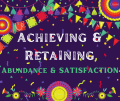
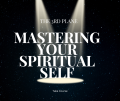


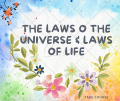










0 responses on "Secret Door to Success: Spiritual Laws and Practical Wisdom"